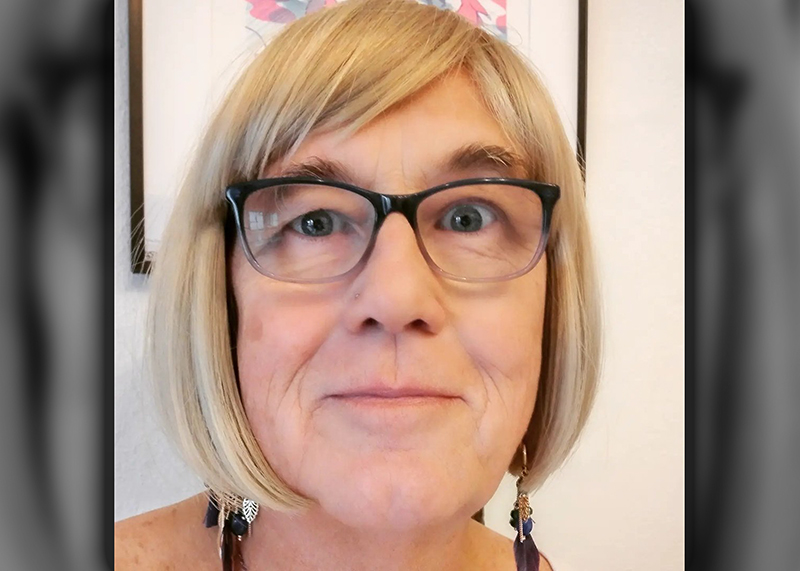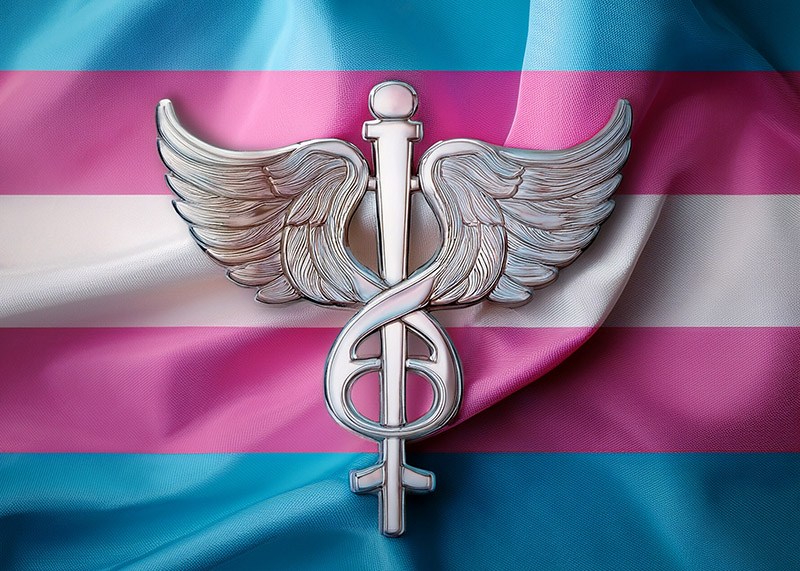Arkansas lawmakers override Gov. Hutchinson’s veto of bill banning health care for trans youth
Advocates warn tying doctors' hands could lead transgender youth to contemplate suicide, self-harm, or self-medication.

Arkansas has become the first state to ban health care for transgender youth.
The Republican-led Arkansas House and Senate have voted to override Gov. Asa Hutchinson’s veto of a bill banning gender-affirming health care treatments for minors, including puberty blockers, hormones, and surgical interventions.
In a press conference announcing his veto on Monday, Hutchinson, a Republican, warned that the bill, as drafted, was a form of “government overreach” that would set precedent for the state to intervene in personal health care decisions and usurp parental rights.
He left open the possibility of signing the bill if it only banned gender confirmation surgeries for minors, but also expressed concerns that the ban on care could lead to increased suicidal ideation, drug use, depression, or isolation among trans youth.
“Part of the Republican base is a restrained government but sometimes you have to pull back and ask ‘Is this the role of the state?'” Hutchinson said. He also objected to the bill’s lack of a grandfather clause for the estimated 200 children in the state currently receiving puberty blockers or hormones who will suddenly have their treatments cut off.
But on Tuesday, the House voted 71-24 to override Hutchinson’s veto, with the Senate voting 25-8 in favor of the override.
The vote makes Arkansas the first state in the nation to bar transgender youth from receiving treatments recommended for gender dysphoria, even if their parents consent.
The bill also bars Medicaid and private insurance from covering treatments for patients under the age of 18, and allows health insurers operating in the state to refuse to provide coverage for any transition-related care.
Advocates have warned that the bill, which prohibits doctors from providing gender-affirming care or referring a youth and their parents to another physician who provides it, will lead health care providers to shun transgender patients for fear of losing their license for “unprofessional conduct” or being charged with breaking the law.
Providers could also fear being sued, as the bill contains a provision allowing minors who received treatments but later regret their decision to sue their former provider for up to 20 years after they turn 18.
Other advocates, including The Trevor Project, the nation’s top crisis intervention and suicide prevention organization for LGBTQ youth, have warned that banning trans youth from receiving gender-affirming care will lead to heightened anxiety and suicidal ideation among an already vulnerable group of people.
“Governor Hutchinson listened to trans youth and their doctors, the state legislature clearly did not. We knew this override could happen, but it is nonetheless devastating because we also know it could have deadly consequences,” Sam Brinton, the vice president of advocacy and government affairs for The Trevor Project, said in a statement. “It is not extreme or sensational to say that this group of young people, who already experience disproportionate rate of violence and suicide attempts, would be put at significantly increased risk of self-harm because of legislation like HB 1570 pushing them farther to the margins of society.”
Other advocates warn that the bill may actually have the opposite effect of what lawmakers desire, pushing trans youth or family members to seek out hormones or drugs on the black market, forcing them to self-medicate without the guidance of a doctor, and with drugs that have not undergone proper regulatory oversight. That’s just one of the reasons why multiple doctors and most major medical associations have come out in opposition to the bill.
Related: Arkansas governor vetoes ban on transgender health care
“The research consistently shows that access to gender-affirming medical care for transgender kids results in better mental health outcomes, and kids who want these interventions but can’t access them have higher rates of a whole range of medical problems, including considering suicide,” Dr. Jack Turban, a child and adolescent psychiatry fellow at Stanford University School of Maryland, told reporters during a press call organized by the Human Rights Campaign.
“Unfortunately, the thing that’s really hard to watch with these political debates is that much of the narrative had been driven by politicians and pundits, people who aren’t really impacted by this legislation,” Turban said. “The people who are impacted are transgender kids, and I think the voices we need to hear are from these kids, their families, their doctors, the researchers in this area who have spent decades trying to understand how to support the mental health of these kids. But that’s not what we’re hearing…. My fear, and the fear among a lot of doctors, parents, and researchers in this area, is if these bills were to pass, we’re going to be throwing away decades of medical progress, and really putting people’s lives at risk.”
“For many of us that do this work, and have been doing this work for many years, devoted to the care of young trans people and their families, these bills are not just heartbreaking, they’re infuriating,” Dr. Robert Garofalo, the division head of adolescent and young adult medicine at Lurie Children’s Hospital, said. “I’m a pediatrician. I take an oath to do no harm. I’ve spent my career ensuring that the young people that I care for get good access to care and have the best chance of growing up to live their lives as healthy, productive and authentic adults, and that these pieces of legislation do anything but.
“Being transgender, it’s not a phase, it’s not a trend, it’s not an affectation. Trans identity is a normal and natural part of the range of human expression, and so to view it as anything other than that or something that is malleable and can be thought of as something that can be pressured by outside influence just flies in the face of what we know, as scores of scientific evidence suggest otherwise,” Garofalo added, noting that transgender health care is not experimental, as its effects have been known and documented in multiple scientific studies for decades.

Garofalo also rejected the idea that doctors are “forcing” parents to subject their children to gender-affirming treatments, noting that no medical interventions are undertaken on minors without parental consent and months of careful deliberation, based on individual patients’ circumstances.
“I thought the nation had learned a bit [from] a very tragic case of a young woman in Ohio who for months on her social media, suggested that her own life and her mental health were at risk if she were not allowed to access care for gender affirming hormones,” he said, referring to Leelah Alcorn. “And unfortunately, that young woman stepped in front of a tractor-trailer on a highway and took her own life. And I thought in that moment, this country had learned its lessons. And so it’s heartbreaking and it’s infuriating for me to be here to talk about bills in 2020, 2021, that are really just designed to discriminate and perpetrate hate.”
The American Civil Liberties Union has vowed to challenge the law in court.
“Today, Arkansas legislators disregarded widespread, overwhelming, and bipartisan opposition to this bill and continued their discriminatory crusade against trans youth,” Holly Dickson, the executive director of the ACLU of Arkansas, said in a statement. “This is a sad day for Arkansas, but this fight is not over — and we’re in it for the long haul. Attempting to block trans youth from the care they need simply because of who they are is not only wrong, it’s also illegal, and we will be filing a lawsuit to challenge this law in court.
“We are hearing from concerned families all over the state who are afraid about the impact of this bill and others like it,” Dickson added. “We are committed to doing all we can to support these families and ensure they know how to continue to fight for their rights and get the care and resources they need.
“No matter what these politicians do or say, one thing has not changed: trans youth are loved, they are seen, and we will never stop fighting to defend their dignity, their rights and their lives. To everyone who spoke out against this bill: now is the time to stay loud, not only for trans lives, but for all the fundamental rights that politicians are hellbent on attacking.”
Read more:
Dr. Rachel Levine speaks out against bills targeting transgender athletes, health care
Kate Winslet knows multiple actors who believe coming out will harm their career
Support Metro Weekly’s Journalism
These are challenging times for news organizations. And yet it’s crucial we stay active and provide vital resources and information to both our local readers and the world. So won’t you please take a moment and consider supporting Metro Weekly with a membership? For as little as $5 a month, you can help ensure Metro Weekly magazine and MetroWeekly.com remain free, viable resources as we provide the best, most diverse, culturally-resonant LGBTQ coverage in both the D.C. region and around the world. Memberships come with exclusive perks and discounts, your own personal digital delivery of each week’s magazine (and an archive), access to our Member's Lounge when it launches this fall, and exclusive members-only items like Metro Weekly Membership Mugs and Tote Bags! Check out all our membership levels here and please join us today!



































You must be logged in to post a comment.